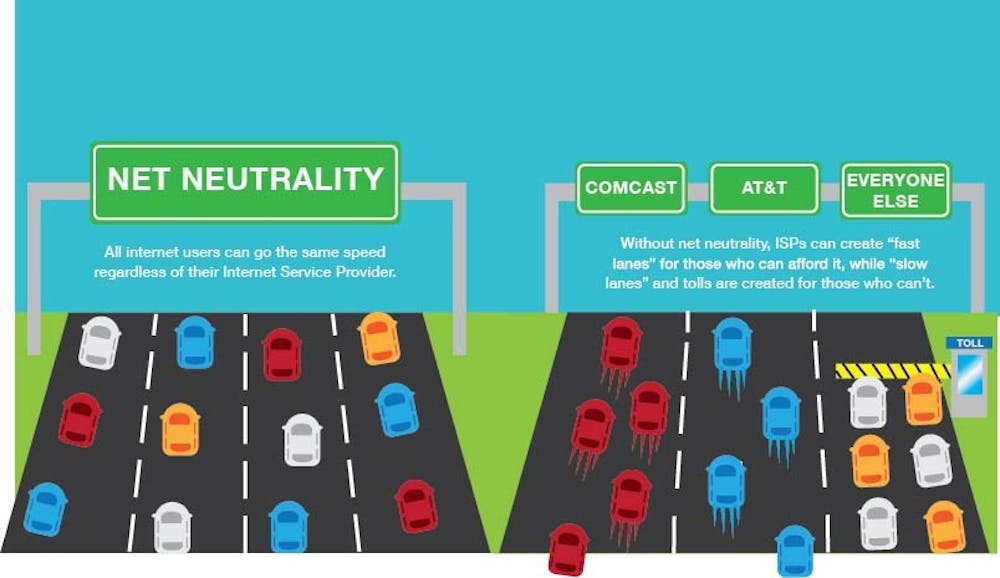EDITORIAL: Killing net neutrality means corporate control of our information
Corporations will have total freedom to charge fees and slow down our internet
Few things should scare you as much as a corporate-controlled internet.
It’s our access to news, friends, family, shopping — more than we can list here.
On Dec. 14, that might change forever. Censorship, extra fees and slower speeds are the future of the internet in America if the Federal Communications Commission repeals net neutrality.
We can stop this. There is still time to save the internet by letting the FCC know you support net neutrality.
Net neutrality is a simple principle — internet service providers (ISPs) must treat all online content the same and cannot discriminate against, or charge users differently, for access to content.
Our unfiltered and unhindered access to information on the internet will be subject to the approval of corporations if net neutrality is taken from us.
The internet is like a freeway — everyone can move at the same speed no matter what vehicle you can afford. Net neutrality has prevented ISPs from separating the internet into “fast lanes” and “slow lanes” or creating tolls for viewing content. You are free to view every website or blog, news site, video streaming service and online retailer.
The FCC rcould make corporations the gatekeepers of the internet with the power to prioritize or block websites. The corporations that own ISPs could force websites and search engines, such as Google or Bing, to negotiate lucrative deals with them or punish them through reduced download speeds.
Companies like Comcast, which owns NBC and is attempting to purchase Time Warner Cable, could punish other networks by refusing to allow access to its competitors or by blocking your access to other news sites.
Imagine trying to binge watch your new favorite Netflix show, while suffering through terrible buffering — all because Hulu paid Verizon for quicker speeds. Imagine trying to load your favorite website, but finding it’s blocked because your ISP determined it “threatens the business of” a news site it owns.
Ajit Pai, FCC chairman, said repealing net neutrality will not threaten a free and open internet. He pointed out that ISPs have “promised” not to block or create fast lanes on the internet like Comcast did in 2014.
“To be clear, Comcast has never offered paid prioritization,” said Comcast Senior Executive Vice President David Cohen when the FCC was crafting net neutrality rules in 2014. “We are not offering it today, and we’re not considering entering into any paid prioritization creating fast lane deals with content owners.”
Unsurprisingly, that changed.
Earlier this year, when the FCC started to debate the future of net neutrality, Comcast filed a public comment stating that a “flexible approach to prioritization (of content on the internet) may be warranted and may be beneficial to the public.”
They’ve backed away from their promise not to prioritize content by creating fast lanes. Comcast has already proved it won’t honor its word.
In 2014, the Washington Post reported Comcast slowed Netflix’s download speeds when the two companies were negotiating in 2013. Netflix’s download speeds plummeted 26 percent until February 2014, when a deal was reached and the speeds increased.
Contact your representative in Congress and U.S. senator. Visit www.house.gov and type your ZIP code into the “Find Your Representative” search box. Contact your Senator by visiting www.senate.gov and click on “Senators” and then sort them by state.
Tell them you support net neutrality in full. Tell them they must lobby the FCC to stop the repeal.
You can also make public comments on the FCC’s website. Go to gofccyourself.com and click on “+Express.” Write that you support net neutrality in full and do not want any changes to the rule.
Our free and open internet is at risk.
Corporations might want the FCC to stop protecting the internet, but we’ll make sure that doesn’t happen. It will take everyone working together and making our voices heard to stop this.
We cannot sit out this fight.







